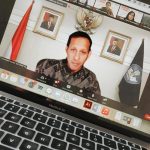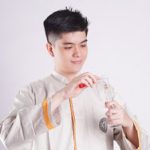Sweltering heat, cocktail blue sky, singing birds – one of the most anticipated seasonal holidays for students, summer! It is the time where students get to refresh themselves and prepare for another school year. However, the COVID-19 pandemic has made the 2020-21 school year difficult for students across the country. Students have attended lectures behind screens, facing stress from distancing requirements and fear of getting COVID-19 – being unable to optimize the learning environment. Stuck in this pandemic, students are able to attend summer school to strengthen and develop their learning skills during their summer holidays. One of the summer schools that I attended is the LJMU Virtual Summer Course. Each of the courses lasts for five days starting from July 5th, 2021 following the U.K time (GMT+1). Every course has the same schedule starting from 9.00 a.m. British time.
It all started when I was getting ready for the day around May, I received a message from one of my lecturers who asked me whether I was interested in any of the following subjects: Mini United Nations, English Culture and Literature, Art and Design, and Media in which I chose English Culture and Literature. The next morning, my lecturer messaged me asking if I have taken an English Proficiency Test (EPT) before in which I have not done during that time. Still bewildered, she invited me to have a Zoom meeting along with a classmate to discuss this matter. In the meeting, it was explained that only two students in Universitas Ciputra (UC) would get a scholarship for a summer course held by LJMU as big as 480 pound sterling, in which one of the students will be chosen from my major (food technology) and one from another. After a long procedure, I was chosen to learn in the Liverpool John Moores University (LJMU) Virtual Summer Course and it was just a matter of time to attend there.
Just as informed, the LJMU Virtual Summer School provided students with a range of courses which are: Mini United Nations, English Culture and Literature, Art and Design, and Media in which I chose English Culture and Literature as my intended course. Each course comprises two classes which focus on its course respectively and one cross-class in which all students from different courses are gathered to learn the culture of Liverpool. Hence, students in the English and Literature course mainly focus on analyzing and critically theorizing different literary works (novels, poems, plays, etc) from past centuries until the present time.
Each of the classes has reading assignments that mostly require us to read in advance before the class starts and consists of three sessions which are the self-introduction, mini-lecture, and mini-seminar. Firstly, the self-introduction is the session in which the lecturer and the students introduce themselves. Secondly, the mini-lecture is the session in which the lecturer presents and explains their specialized area of expertise. Lastly, the mini-seminar is the interactive session where each individual discusses their own perspectives about the given literary work. Oftentimes, the lecturer would try to connect the literary work to the contemporary literature also our cultures respectively – from the UK, China, Indonesia, and India. I was impressed by the differences in our cultures and still be able to connect as a whole. On the contrary, I do hope that there were more participants or the current participants contributed more to the discussion.
I was also impressed by the cross-class as students were able to learn more about the culture in the UK, particularly Liverpool. In contrast, I was shocked that the rector of my university (Universitas Ciputra) discussed the culture in Indonesia during the last day of my summer course. However, it made me happy to see lots of international students asking questions about the cultural heritage of Indonesia. Overall, it was a refreshing experience as I got to learn english culture and literature in an international environment while gaining new knowledge that is outside my field of study.





